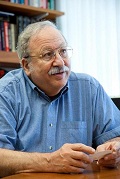We are publishing today my interview with master organizer Marshall Ganz. It’s on the eve of the meeting of the Democratic National Committee in Atlanta at which a new chair will be chosen. In the interview, Marshall is skeptical about focusing the initial efforts of liberals and left on taking over the party,. He thinks the most important task is to build an organized movement on the ground that can shape the Democrats and challenge the Republicans. But it will be difficult to do this effectively, and I want to put Marshall’s reasoning in my own words.
Republicans succeeded in doing so over the last two or three decades because they could draw on existing institutions. Marshall mentions the evangelical churches and the NRA’s gun clubs. I’d add the local chambers of commerce, which have become solidly Republican, as well as other business associations. These are now part of the infrastructure of the Koch network, along with policy groups and national organizations like Americans for Prosperity. What distinguishes these existing institutions is that they have a function and life of their own outside of immediate electoral politics that sustains their membership. In his study of the Sierra Club’s chapters, Marshall found that the most successful were those that had a function outside politics. What does this mean for Democrats?
For many years, the Democratic party had a strong institutional base in the labor movement, big city and Southern political machines, and to some extent the Catholic Church and its hierarchy. The labor movement is down to representing about 11 percent of the non-farm workforce, and the most active unions are the service sector and public employee unions, and the public unions operate at a disadvantage because their workers are paid by, and often pitted against, the taxpayers. The Democratic urban and Southern machines are gone, and the Catholic churches are no longer Democratic preserves. So the party really does lack an institutional (non-political) base from which to build an organized movement. That’s a huge problem that faces the Democrats. Maybe not in the next two or four years if Trump and the Republican leadership sufficiently alienate the electorate, but over the long haul.
I used to think that the virtual communities created by the internet could replace the union hall, neighborhood pub and other popular institutions. The internet has proven effective in organizing demonstrations, and in allowing functioning groups to communicate. Our neighborhood organization operates largely through a listserve. But it’s no panacea, as the experience of Moveon.org and similar groups can testify. I don’t have an answer to this dilemma, but if you want to see it posed clearly, read what Marshall Ganz has to say.






